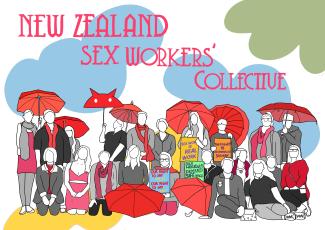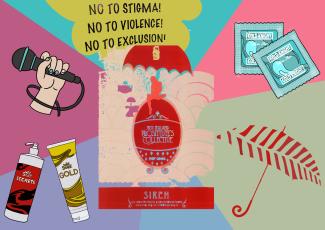Written and interviewed by Tenzin Dolker
Edited by Muna Gurung
Illustrations by Priyanka Singh Maharjan

Over the last few years I spoke to a number of incredible feminist activists from different parts of the world. Sharing deep insights about the past and present state of feminist organizing and resourcing, they reflected on the complex, multi-sourced, and often invisible ways that movements resource their work. We discussed forms of resourcing that are autonomous or outside philanthropic and governmental models, which we have been calling, “autonomous resourcing.”
The first conversation we shared was with queer activist, Chayanika Shah, who is based in Mumbai. Second in the conversation series, I spoke to Dame Catherine Healy, a sex workers’ rights activist, and founder of the Aotearoa New Zealand Sex Workers’ Collective (NZPC). Initially known as the New Zealand Prostitues’ Collective, NZPC is led by sex workers who engage in advocacy for sex workers’ rights, safety, health and empowerment. NZPC was instrumental in passing the Prostitution Reform Bill in 2003, which decriminalized sex work in New Zealand. Dame Catherine shares intentional and strategic ways they built capacity for autonomous resources over the decades since the collective’s founding in 1987.
As a feminist hybrid collective, NZPC moves fluidly from providing life-saving services, agitating regressive norms as activists, to fighting off corporate conglomerates by carving out their own markets with products like Wetstuff, a water-based lubricant, and other related merchandise. As Dame Catherine says, “We are a hybrid: we are a rights-based collective, as well as a service provider. We are all things.” That’s the power of autonomous resourcing; it resources feminist structures in all their creativity and imagination, giving them full power to say “NO” to traditional forms of funding that don’t meet their political needs and values.
Below is our conversation edited for length and clarity.
Tenzin Dolker:
Does the Aotearoa New Zealand Sex Workers’ Collective (NZPC) identify itself as a feminist group? And is the collective membership-based?
Dame Catherine Healy:
Yes, we call ourselves a feminist group. At NZPC, everyone belongs. We started out as a charitable trust and remain a not-for-profit organization. We do union type activities, but we don't call ourselves a union; we are simply a collective. We try to keep a flat structure and sex workers don't have to sign-up, they all belong.
TD:
So, in terms of members, what are the visible and invisible ways in which members bring resourcing to the organizing work you do?
DCH:
We have a board of trustees who employ me, and I, in consultation with regional coordinators, employ regional staff. And then we have people who come in through the door with ideas. For instance, Covid-19 means more people are turning to working online, so we have assisted a sex worker to develop a resource to promote safety in this area. If someone has an idea, we help make it happen. The idea need not be well-researched, it can just arise from a feeling. The collective is a free-flowing entity, and we talk about strategy but that’s not my favourite word. We like to keep it organic.
TD:
It's fantastic how members and the trustees are all co-creators. To deepen our understanding of your work, can you share a little about where funding comes from for NZPC? And also, the types of grants you receive and why you resource in this way.
DCH:
In the late 80s, we were approached by the government to provide services to our peers in sex work. So, in partnership with the government, we designed services that we would provide, and settled on outcomes we hoped to achieve. The relationship with the government has sustained for over 33 years now and a bulk of our funding comes from that contract.
However, we also have an enterprise that gives us a margin and the ability to keep some distance from the government when we need to be critical. We import and distribute a water-based lubricant widely throughout New Zealand. Our products are distributed to what is generally termed as “health sectors,” which also include spaces like schools, youth clinics, and gay clubs. And because we are able to keep the prices low, we compete with big corporate providers like Durex. We also sell soft tampons that we provide to sex workers; but we are not in the business of trying to make money off of sex workers. It does, however, bring in some income for the collective.

TD:
It sounds like when you have to do certain advocacy work or critique specific government policies, or take an unpopular stance, you see the need for autonomous resourcing. Would you be able to speak to why that's important for your work?
DCH:
There was a time in our history when we were criticized because we were pushing for the decriminalization of sex work. We see decriminalization of sex work as a necessary step to protect the safety, rights, health and well-being of sex workers. It’s not inconsistent with the concerns around sexual reproductive health and HIV awareness, but that was not understood by all the politicians in parliament. So, when we were called out to show how we were using government money in our community, it was important for us to prove that our advocacy work, in the context of pushing for decriminalization of sex work, was not sustained by government funding. I got up on a Saturday morning and my face was on the front page of a daily newspaper with a blazing headline that went something like: “Prostitutes use government money for advocacy.” We went through an audit to prove that, in fact, that wasn't the case. Our autonomy is really important; we don't want to be puppets.
TD
In terms of the budget for NZPC, would you be able to share some quick numbers?
DCH
Our government contract is about 1.1 million Kiwi (just under 0.8 million USD) and around 10% of our budget is self-generated. We just sold one property and bought another from our own resources. It’s a great feeling to know that sex workers can have a place to call their own as they are always surrounded by so much stigma and discrimination. A physical place can generate a sense of security and reassurance that we can’t be displaced.

TD
In our earlier conversations, I remember you speaking about the polarized political context around undocumented migrants and undocumented migrant sex workers. Can you expand a little around the sensitive work that you are able to do in New Zealand and how that ties to NZPC’s self-generated resources?
DCH
We had developed a resource specifically for undocumented migrants who were involved in sex work while on tourist visas. Once again, we were attacked in the media for supporting those who were perceived to be breaking the law. It got hot and heavy fast. We reasoned that for the benefit of our national public health, it is important that everyone who is sexually active in our communities have access to resources regardless of their immigration status. We explained then that it was entirely appropriate to use our government funding for that resource to be supplied to these communities of sex workers even if they were perceived to be in breach of immigration laws. But if it hadn’t gone as smoothly as it did for us, we could have easily said, “Look, we can do this with our own funding,” without complicating or implicating government funding.
TD
Absolutely. In that way, what are the kinds of funding that you receive or want to receive that are most useful?
DCH
That’s an interesting question. Well, one thing is we don’t accept donations from brothel operators unless it’s for the direct welfare of a sex worker or their family in an extreme situation where no other support is available. We also wouldn't want to accept advertising money. We regularly publish little magazines and we want to keep those magazines pure or without sponsorship from anyone in the sex industry, because we don’t want to appear as though we have been manipulated. Already a lot of sex worker rights groups are accused of being part of the so called “pimp lobby”. We feel that it's really important to maintain our distance but also be supportive of those businesses by supporting their right to exist.
TD
That makes sense. I’m wondering then if there are other institutional funding that you receive through private philanthropy or international funding?
DCH
Yes, we have a 20-year-old relationship with two private trusts. We have to apply each year for both of these resources, but it is something regular that comes to us. We've also had instances where people have made one-off grants to us but we try not to lean on philanthropic giving because there is a lot of competition for that, and they tend to get complicated. We also prefer something more sustainable.
As for international funds, we don’t feel comfortable applying in the international arena since we come from a wealthy little country. It doesn't sit right ideologically for us to be in that application pool. When you look at the need for sex workers’ rights-based organizations around the world, we certainly don't see ourselves as being a part of that queue for funding; we are privileged.
TD
It seems like that’s an important political choice for you. So, in reflection then, what would you say is the best kind of funding that you've received?
DCH
As a fledgling organization, we had to learn to manage our funding and our relationships and the demands on the organization. As we grew, the funding grew with us. If we’d been given the amount of funding we receive today back when we had just begun, I suspect it would have been a burden for us. We've been on the same amount of funding for the last 12 years and that's been an interesting exercise; instead of wishing for more money, we think about how we can work most locally, effectively, intelligently and make the fund go further to achieve what we envision.
TD
Although the capacity of feminist organizations is a pertinent discussion, it is also not always about getting more money necessarily. From your perch, what do you think are some of the issues that you feel are not supported and are in need of more ambitious resourcing?
DCH
The migrant issue for sure. When we were attacked for developing resources for migrant sex workers, I realized how unpopular our stance was. The District Health Boards that set up sexual health clinics felt they had to keep their heads down because they were providing testing and treatment services to migrant sex workers who were in New Zealand on tourist visas. It is not good when people’s confidence is undermined and they feel unsure of what they should be doing. We were attacked but we felt confident that we were doing the right thing. The Ministry of Health was attacked for providing funding to us, and we engaged with them to explain why we were doing what we were doing. Of course, they backed us up; we were fortunate. But imagine, if it had been a different political environment. For us, there is a strong sense that we have to advocate fiercely for people who are wedged in illegal spaces. Sex workers are quite often in those spaces. And as sex workers’ rights activists, it only follows that we carry their stories forward and ensure that they are well-supported within the human rights framework.

TD
How are you managing that now?
DCH
Part of it is a heads-down approach, and part of it is speaking out as well. The head-down approach is working behind the scenes in raising awareness across anti-trafficking groups who are, oddly enough, very supportive in this country; or while working with government officials who themselves are lobbied quite hard by people in the community to do something about the illegality of sex workers. We have a political agenda but we don’t have a bill in parliament yet. We have lot of research and we have a recommendation from the Committee to Eliminate Discrimination Against Women (CEDAW) asking the government to look into this.
TD
It's really fascinating that you have this inside-outside strategy in place. I am wondering if there is space for a philanthropic resourcing ecosystem to reach these individuals and mobilize them?
DCH
We have outreach workers who are adept at making contact with the migrant sex workers populations. We have an NZPC worker in our largest city, Auckland, which is a city of 1.5 million. She comes from a migrant community herself. In some regards, if the funding had come from our own resources we could do more, but what that also does is it lets the government slide out the back door without owning any responsibility, or helping to spread awareness to every migrant sex worker in New Zealand that they have certain rights. Philanthropy…that “P” word may make it less complicated to do things but it doesn’t necessarily fix things.
And in terms of organizing or mobilizing these communities, we are struggling because we work with individuals, and also there is a pattern to migration. For instance, some people are only here for three months. The community talking on social media while we feed into those conversations is a great model; we are able to ensure that they have access to condoms and that they know they can come in for check-ups. But in terms of them leading on their own, we simply have one worker and one volunteer at the moment.
TD
It seems like it’s challenging for any kind of organizing to take place.
DCH
Yes, and addressing these issues is often done in stealth, but it shouldn’t be like that. We make sure to mention “migrant sex workers” explicitly in our contracts with the government. The migrant sex worker issue should be the government’s responsibility. Earlier we were dealing with a sex worker who had a terribly violent experience and the police was made aware of this so that they could catch the perpetrator. But she didn't want to speak to the police, and while she was in the hospital, she said: “I surrender.” It was chilling to hear those words from her; it was clear that she had felt like she was the criminal who had to surrender. It shouldn’t be this way, which is why I believe we have to lift up these sorts of situations and be explicit about funding and not approach them by stealth.
